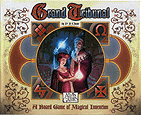
|
About OgreCave and its staff
|

|
by Brian Darnell
Grand Tribunal is a board game from Atlas Games set in the Ars Magica world. Having no idea what Ars Magica is all about, I'm going to stick to a review of the board game on its own. The general idea is that the players are mages out to prove their worth by competing in a series of three contests (tribunals) to see who can make the most worthy magic items. These magic items are judged based upon criteria that the players themselves put forth during the game.
Spelling it out Included are three main types of cards: Items, Spells, and Resources. Item cards are used by the players as a base; without items, one cannot score any points. Spells are used to enhance items, and also can be cast (and discarded) to have some effect in the game. Resources are special abilities that don't directly help to score points, but can make it easier in certain ways. Among the chips, there are three types as well. Award chips are roughly poker-chip like in three colors (Blue, Red, or Yellow) and denote the winners of the tribunals. Vis chips are smaller and black, roughly equivalent to a tiddlywink. Voting chips are the same size and shape as Vis, but white. The rulebook is a single sheet, folded to make four pages, so it is fairly brief. There are some issues with the rules as presented, but Atlas provides some corrections and clarifications on the game's web page. I highly recommend looking these over - especially the FAQ/Errata - before trying to play this game.
Invoking the Tribunal After placing the voting tokens, the first player takes two actions, which must be different from each other. Then play passes to the next player who then takes two actions, and around clockwise until reaching the last player. Then the Praeco pawn passes and there is a new start player who places three votes and starts the round of actions. After each player has been Praeco once, then there is a tribunal. There are several choices players can make for actions. One can take an item or spell (from either the three face up cards or from the deck). Another action is to place a voting token on any space. Alternatively, a player can advance their Spells or Items by taking some of their Vis and placing it on the cards. Items have varying advance costs, while spells all have a cost of two Vis. Still more things a player can do with an action: Cast a Spell (if it and the Item are active and it is installed on the Item); play a Resource card; or extract Vis (gain 1 Vis, or gain 2 Vis during the final tribunal). There are also activities that take both actions on a player's turn - Draw a Resource Card, or Gather Vis. Gathering Vis is a way to get a lot of Vis, but it will also benefit the other players by giving them a lesser amount of Vis for free. Once each player has been Praeco once and all have finished their actions, each active Item is automatically entered in the tribunal contest. Players look at their Items and figure out how many votes it gains by comparing the item type and any spell types installed on that item to the voting spaces. For example, if someone has an Orb with an Alchemical spell on it, then they count the number of votes on 'Orb' and add it to the number of votes on 'Alchemical'. The Item with the most votes wins first place and gets a blue award chip. Second place gets a red chip, and third gets a yellow one. Items score points based upon what place they won in the contest - blue is (item base value + # of installed spells + other modifier) x4, while each place after that decreases the multiplier (2nd gets 3x, 3rd gets 2x, runners-up all get 1x). Any item that wins an award chip will not be entered in any future tribunals. After three tribunals the scores are added up and whoever has the most wins.
Mystical notations
On the positive side, the collective voting mechanic worked well and made gameplay interesting. Additionally, a player who manages their Vis carefully will gain an advantage late in the game, adding another aspect to engage strategic thinkers.
Conclusions Grand Tribunal is a playable, moderately fun game with some interesting mechanics. Most people I played with said they would play again. However, given the huge array of great games out there, I wouldn't recommend it unless you're an Ars Magica fan, or maybe someone who really likes the theme otherwise.
|
||||
 Grand Tribunal
Grand Tribunal